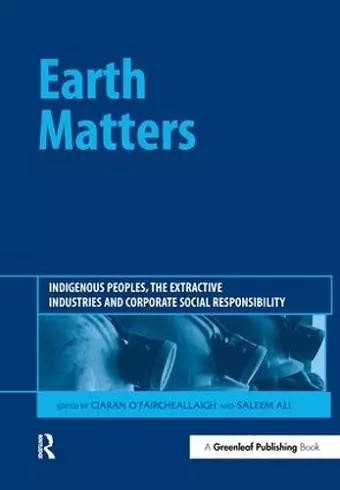Earth Matters
Indigenous Peoples, the Extractive Industries and Corporate Social Responsibility
Ciaran O'Faircheallaigh editor Saleem Ali editor
Format:Hardback
Publisher:Taylor & Francis Ltd
Published:1st Nov '08
Currently unavailable, and unfortunately no date known when it will be back

"This book challenges the extractive industry to examine some difficult dilemmas confronting miners and indigenous peoples in terms of corporate social responsibility ... Any mining executive – indeed any developer – concerned about the social context of a project will find this a stimulating and thought-provoking read." Tom Albanese, CEO, Rio Tinto
Indigenous peoples have historically gained little from large-scale resource development on their traditional lands. This book explores the great diversity of approaches to corporate social responsibility (CSR) in the extractive industries, and the complex and evolving nature of indigenous-corporate relations.
Indigenous peoples have historically gained little from large-scale resource development on their traditional lands, and have suffered from its negative impacts on their cultures, economies and societies. During recent decades indigenous groups and their allies have fought hard to change this situation: in some cases by opposing development entirely; in many others by seeking a fundamental change in the distribution of benefits and costs from resource exploitation. In doing so they have utilised a range of approaches, including efforts to win greater recognition of indigenous rights in international fora; pressure for passage of national and state or provincial legislation recognising indigenous land rights and protecting indigenous culture; litigation in national and international courts; and direct political action aimed at governments and developers, often in alliance with non-governmental organisations (NGOs).
At the same time, and partly in response to these initiatives, many of the corporations that undertake large-scale resource exploitation have sought to address concerns regarding the impact of their activities on indigenous peoples by adopting what are generally referred to as "corporate social responsibility" (CSR) policies. This book focuses on such corporate initiatives. It does not treat them in isolation, recognising that their adoption and impact is contextual, and is related both to the wider social and political framework in which they occur and to the activities and initiatives of indigenous peoples. It does not treat them uncritically, recognising that they may in some cases consist of little more than exercises in public relations. However, neither does it approach them cynically, recognising the possibility that, even if CSR policies and activities reflect hard-headed business decisions, and indeed perhaps particularly if they do so, they can generate significant benefits for indigenous peoples if appropriate accountability mechanisms are in place.
In undertaking an in-depth analysis of CSR and indigenous peoples in the extractive industries, the book seeks to answer the following questions. What is the nature and extent of CSR initiatives in the extractive industries and how should they be understood? What...
This, when published, was a brave book. It tackles community issues which are uncomfortable for many companies because the resolution of the issues is neither clear-cut nor complete. The documentation of the issues is an important contribution to the on-going search for solutions. The book chronicles efforts and activities relating to indigenous peoples who are directly or indirectly affected by mining activities. There is more reference to experiences with aboriginal peoples in Australia than other areas of the World (which include indigenous peoples in Russia, Peru, Ecuador, Papua New Guinea and the Arctic). I was disappointed with the depth of material covering Africa, which has its own set of social and economic problems, as it reflects against women, artisanal miners and children.Having said that, the book is rich in detail and depth for the areas and grouping it does cover. The different papers make extensive reference to the available literature on their various subjects and they give clear and detailed perspectives. * Eagle Bulletin 20.1 (July 2010) *
I just came across a new volume edited by O'Faircheallaigh and Ali which focuses on an interesting, important, yet often ignored relationship between resource extraction and indigenous peoples. Understanding that the extractive industries are almost never led by indigenous peoples, these interactions are then global in nature, and span a history of conflict and unease. The volume editors were wise to engage the authorship of important thinkers of today, as the problematic explored reaches far and wide, and it must, then, be explored with different lenses. The book achieves a solid balance between theoretical insight and illustrative content, to a variety of audiences interested on this timely and critical topic. * Catalin Ratiu weblog, November 2008 *
It is rare and refreshing to find an academic book that focuses on a single issue in a particular sector … most [chapters] have clear practical relevance, covering issues like stakeholder agreements, social impact assessment and engagement with indigenous women ... CSR academics focused on either the extractives sector, or indigenous people will find this an extremely useful collection. Even for CSR managers with responsibilities in these areas, there are insights and lessons to benefit from, if they hone in on the particular countries, sectors and issues that fit their responsibilities or tackle their most pressing challenges. I hope this book becomes the trailblazer for a new sector-based, issue-specific genre of presenting academic research. -- Wayne Visser, Founder & CEO, CSR International
ISBN: 9781906093167
Dimensions: unknown
Weight: 600g
272 pages